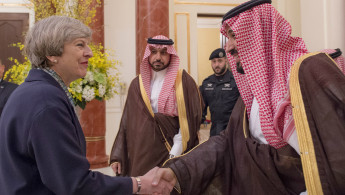British government 'finalising' $2 billion loan guarantee for Saudi Aramco
The UK Treasury confirmed it is “finalising” the credit backstop with the world’s largest oil producer through its UK Export Finance (UKEF) group.
“We will be providing Saudi Aramco with support in the form of credit guarantees to procure from the UK," a Treasury spokesperson said.
"This builds on previous support for UK exports as part of Saudi Aramco joint venture projects.”
The loan comes on the top of almost £500 million already handed to the oil and gas giant over the last five years, most recently for the Sadara chemicals project, Saudi Aramco's joint venture with Dow Chemicals.
It coincides with efforts by Britain to persuade the state Saudi energy company to list its shares on the London Stock Exchange in an initial public offering, The Financial Times reported. It is billed as the largest ever initial public offering.
FT added that a spokesperson from Prime Minister Theresa May’s office said this week the London Stock Exchange has made a “very strong case” for the listing.
The deal comes as Riyadh makes more arrests and freezes more bank accounts in a growing anti-corruption crackdown that has netted dozens of royals and high-profile businessmen.
Saudi authorities have frozen over 1,700 domestic bank accounts since the purge began on Saturday, when authorities in the Gulf powerhouse launched what they said was an anti-graft drive which has seen the arrest of dozens of leading businessmen and politicians.
Those detained included billionaire Prince al-Waleed bin Talal and the head of the national guard, Prince Miteb bin Abdullah.
Powerful Crown Prince Mohammed bin Salman was behind the arrest orders after he became head of the Anti-Corruption Committee created earlier the same day.
Human Rights Watch said on Wednesday that the crackdown could in fact be more a case of internal power politics.
"While Saudi media are framing these measures as Mohammed bin Salman's move against corruption, the mass arrests suggest this may be more about internal power politics," said Sarah Leah Whitson, Middle East director at the New York-based HRW.





 Follow the Middle East's top stories in English at The New Arab on Google News
Follow the Middle East's top stories in English at The New Arab on Google News
![Both Hamas and the Palestinian Authority welcomed the ICC arrest warrants [Getty]](/sites/default/files/styles/image_330x185/public/2024-11/GettyImages-2178351173.jpg?h=199d8c1f&itok=TV858iVg)

